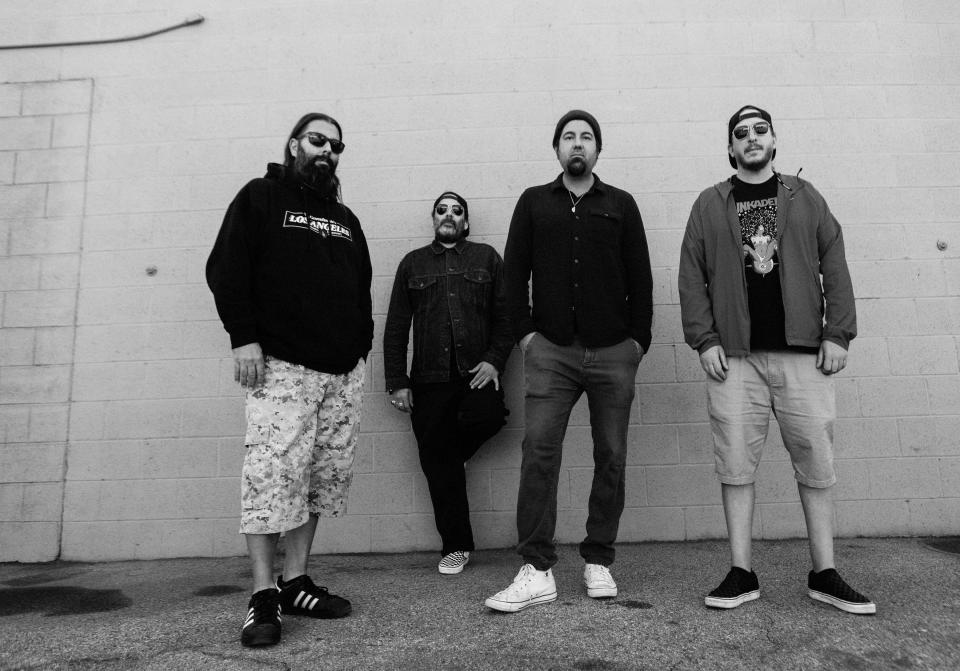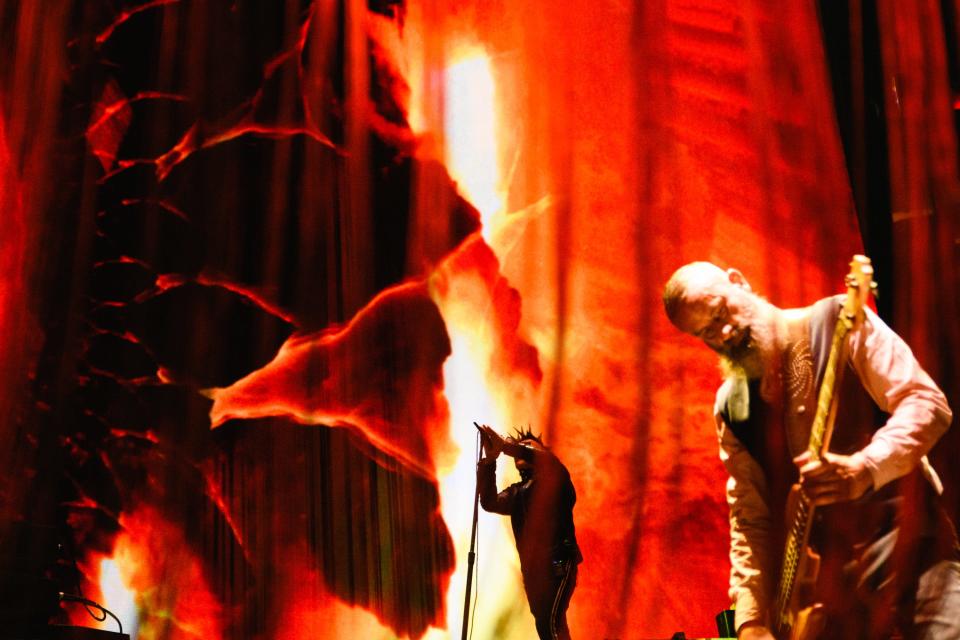Welcome to Rockville: What are the 5 best albums released by 2023's headliners?
Editor's note: Readers may know Ryan Pritt as the News-Journal's top-notch sports editor. Who knew he was an avowed heavy-metal fan? If the sports thing doesn't work out, you have a future as a music critic! Take it away Ryan.
Welcome to Rockville serves as both a showcase and proving ground for artists, pairing heavy metal legends with up-and-comers to provide attendees with a good sense of the past and the future.
The 2023 edition will be no different. The four-day festival kicks off Thursday, May 18, and will rock through Sunday, May 21 with Tool as the closing act.
Tool, formed in 1990 in Los Angeles, is just one of the acts with decades of success behind it. Pantera, Deftones, Slipknot, Godsmack, Evanescence, Incubus, Avenged Sevenfold, and others have been stalwarts of the genre for years.
WELCOME TO ROCKVILLE 2023: When will my favorite band be playing?
WHERE CAN I STAY?: Tickets, hotels selling out fast. Here's where to stay.
LAST YEAR'S EVENT: Fire-eater sues Welcome to Rockville over alleged attack at last year's concert
But what if you're a younger fan that isn't familiar with some of this year's artists' previous work? Don't worry, we've got you covered.
Below is a list of the five best records by my calculations to be released by the 2023 Welcome to Rockville artists:
5. Deftones, White Pony (2000)

Deftones, formed in 1988, are probably the toughest of the bands to identify a single release among the major artists performing at Rockville. But of their nine full-length releases, none combine all the aspects of the band any better than White Pony.
In mid-90s releases like Adrenaline and Around the Fur, Deftones pounded listeners into the ground. On later releases such as 2010’s Diamond Eyes, 2012’s Koi No Yokan, and even 2020’s Ohms, listeners are coaxed into taking flight and soaring.

On White Pony, you’ll do both and be better for it. Songs like “Feiticeira” and "Elite" draw from the band’s raw past with “Change (in the House of Flies)” and “Digital Bath” pointing to its more progressive and ethereal future. Sometimes – “Street Carp”, “Back to School (Mini Maggit)” – there are elements of both in one song.
While White Pony marks a crossroads of sorts, the band's discography is a choose-your-own-adventure, and no matter what path you take from here, you’ll find a band that’s made a career out of evolution and development. Perhaps that’s why Deftones seems to become more revered as younger fans continue to trace that lineage.
Chino Moreno has remained one of the most dynamic frontmen in the genre for nearly three decades, blending the (now) occasional scream with some of the smoothest, texture-driven chorus melodies in the game all while musically, the band remains enigmatic behind dissident chording and punchy riffs with off-beat sections.
But to define Deftones is limiting. Chances are, in just a few years, the band will sound like something altogether different. And somewhere therein, the band’s greatness is defined.
Standout tracks: “Digital Bath”, “Elite”, “Passenger” (featuring Tool’s Maynard James Keenan)
4. Avenged Sevenfold, Waking the Fallen (2003)

All it took was just a little bit of maturation. That, and one hell of an ace guitarist.
Equal parts of both propelled Ax7 from an eyebrow-raising debut with 2001’s Sounding the Seventh Trumpet to a statement of purpose with Waking the Fallen. Even if modest, early sales indicate that it took a while for everyone else to catch on.
There’s no denying Synyster Gates’ standing among modern guitar gods; he’s to millennials what Slash is to Generation X. And it starts here with his first full-length appearance. Gates puts down a gauntlet of blazing solos and riff acrobatics that remain interesting, propel songs forward, and explore the boundaries of metalcore and beyond.
Along with singer M. Shadows’ most calculated and best-executed blending of harsh and clean vocals to date, the band’s power duo steers the ship while bassist Johnny Christ, drummer The Rev, and rhythm guitarist Zacky Vengeance propel it. Together, Avenged Sevenfold begin to chart the course for mainstream relevance, and while most fans likely found this gem retroactively, there’s no denying its uncompromising aggression and ingenuity.
That’s especially true of Gates, with the transition between “Desecrate Through Reverence” and “Eternal Rest”, a blazing solo building to perhaps the record’s most infectious groove riff, serving as the brightest of numerous album highlights. But it’s the all-out ballad “I Won’t See You Tonight, Pt. 1”, a song that conjures justified comparisons to Guns N’ Roses’ “November Rain” that hinted at the diversity the band would one day wield.
Now 20 years old, Waking the Fallen serves as a metalcore textbook. Even though its authors quickly burst through the genre’s constraints.
Standout tracks: “Eternal Rest”, “Radiant Eclipse”, “I Won’t See You Tonight, Pt. 1”
3. Incubus, S.C.I.E.N.C.E (1997)

Of all the records unjustly and retroactively grouped under the dreaded “nu metal” umbrella, and there were several (see: Mudvayne, L.D. 50), this may be a more egregious case of miscasting than Cameron Diaz’s appearance in Gangs of New York.
Sure, there are some of the same elements here, primarily the frantic, yet, in this case, complementary scratching and samples of DJ Lyfe, but fried chicken and chocolate cake both contain flour and salt. This album is as much funk, hip hop, and electronica as it is metal.

Petty classifications aside, what S.C.I.E.N.C.E. truly is, is a must-have for anyone who enjoys dancing as much as moshing. Frontman Brandon Boyd draws from the playbooks of Mike Patton and Anthony Kiedis among others, wailing over the top of thunderous, Claypool-ian bass lines and sometimes playful and experimental, other times crashing and chaotic guitar lines matched only by early Korn records in terms of sonic diversity.
To push play is to step through a portal and into an alternate reality. A reality that, at least at first, leaves the listener with no choice but to head nod as to find something to cling to amid the dizzying storm of seamless transitions and genre hopscotching. And then there’s the drumming of Jose’ Pasillas, who manages to carve a place in the frenzy while also imposing welcomed order amidst the chaos.
Perspective is forever changing, and a record the band once ran from, choosing not to acknowledge in live performances for years, remains one of the most unique listening experiences in popular music over the last four decades. If anything, its mystery and allure are more intriguing and magnetizing now than ever and the direction Incubus chose to take in its wake, leaving most of its hard rock roots behind, only adds more value to S.C.I.E.N.C.E.’s existence.
This is a late-90s time capsule waiting for you to dig up and enjoy.
Standout tracks: “Vitamin”, “Summer Romance (Anti-Gravity Love Song)”, “Calgone”
2. Pantera, Vulgar Display of Power (1992)
If Nirvana’s Nevermind is credited for killing hair metal, Vulgar Display of Power buried it for good, with Pantera leaving behind all remnants of such leanings, replacing wails with growls and sheen with sludge.
“Mouth for War” serves as a strong opener and a hint that something’s amiss here in comparison to 1990’s Cowboys From Hell. But it’s the opening, high-pitch pinch harmonics of Dimebag Darrell's guitar in “A New Level’, the album’s second track, which immediately plummet into filthy, eighth-note, barre-chord oblivion that serves notice of something new, something different and something brutal. By the time the same riff is palm-muted, all bets are off. And the skin on your face likely is as well.
From there, just try to find a note out of place. The few instances in which the record eases up — primarily in “This Love” and “Hollow” — serve only to further ensure that the ensuing blows land flusher and with more force. By now, tracks like “Walk” and “(expletive) Hostile” are part of the zeitgeist, but there’s no reprieve and nowhere to hide in tracks like “Rise”, “Live In a Hole” or “Regular People (Conceit)” either.
Much can be made of the performances. Whatever the Mount Rushmore of metal guitarists looks like, Dime is comfortably on it. He revolutionized his sound and the genre here, carving out a signature style as unmistakable as that of Eddie Van Halen, Stevie Ray Vaughan or Tool's Adam Jones. His untimely death in Columbus, Ohio shooting in 2004, remains one of music's greatest tragedies.
Vinnie Paul’s popcorn-machine double kick and timing is impeccable. Frontman Phil Anselmo’s performance and the influence it bore on future heavy vocals is nearly impossible to overstate. Rex Brown carries the bottom end selflessly and is as important yet underappreciated as so many bassists before him, notably John Paul Jones.
But while its parts are great, it’s the sum that will stand for eons. Never has the front of an album — a simple, black-and-white photo of a man being punched in the face — been more appropriate or summative..
Books are one thing, but feel free to judge this album by its cover. You’ll take its best shot, ready or not.
Standout tracks: “A New Level”, “(expletive) Hostile”, “This Love”
1. Tool, Lateralus (2001)

Whatever world Rush built in 1978 with Hemispheres, Tool’s Lateralus serves as its Upside Down.
For those of you who aren’t Stranger Things fans (first of all, how?), that’s just to say the record possesses all of the progressive instrumental and vocal acrobatics of early Rush and Yes releases, but this is no fictional tale or fantasy adventure. These songs are far more preoccupied with the human condition and in that, comes its share of darkness.
Here, Tool reaches the summit of its structure-bending game of time-signature tetherball. For starters, there are 47 meter changes and 12 unique time signatures in “Schism” alone. But the album’s highest-charting single (67th in the US) is perhaps its best example. One can become lost in the movements or the fluctuating rhythms, but at its core, “Schism” is … gasp … a song about a relationship. And a gorgeously written one at that.

The album is as moody as any you’ll find. In "Schism", singer Maynard James Keenan’s viewpoint of the widening gap between lovers is matched by sullen, jarring, and at times, terrifying riff and bass work. But it’s not all gloom and doom. “Reflection” hints at themes of gratitude and unity all with backing instrumentals pulling from Led Zeppelin’s “Kashmir” more than doom metal.
And on it goes, each track its own universe with notes strewn like stars across the sky in (seemingly) no particular order, leaving the listener to trace out his or her own pictures and constellations. It all peaks with the title track, a song based around the Fibonacci sequence but lyrically pointing to matters of far less rigidity: self-exploration and our place in our world and beyond.
That’s where Lateralus most stands apart. 1996’s Aenima contains much of the same technical brilliance from guitarist Jones, bassist Justin Chancellor and drummer Danny Carey, and even darker undertones, but the biggest change can be felt in Keenan’s themes, growth, delivery, and mood. In the title track to Aenima Keenan implores “Don’t just call me pessimist.” Across 78 minutes and 51 seconds of existential pondering and sporadic, aspirational sentiments on Lateralus, he gives us a reason not to.
Lateralus runs the gamut of emotions and you're along for the ride, free to move about the cabin, gaze through the windows and discover things about yourself along the way. You’ll smile, seethe, reflect, contemplate, and weep (like a widow, in fact) escaping mundane, everyday life in the process.
You’ll be hard-pressed to find any record more cinematic, more challenging, and with each additional spin, more fulfilling.
Standout tracks: “The Grudge”, “Schism”, “Lateralus”
This article originally appeared on The Daytona Beach News-Journal: Welcome to Rockville: The 5 best records released by bands at Rockville

